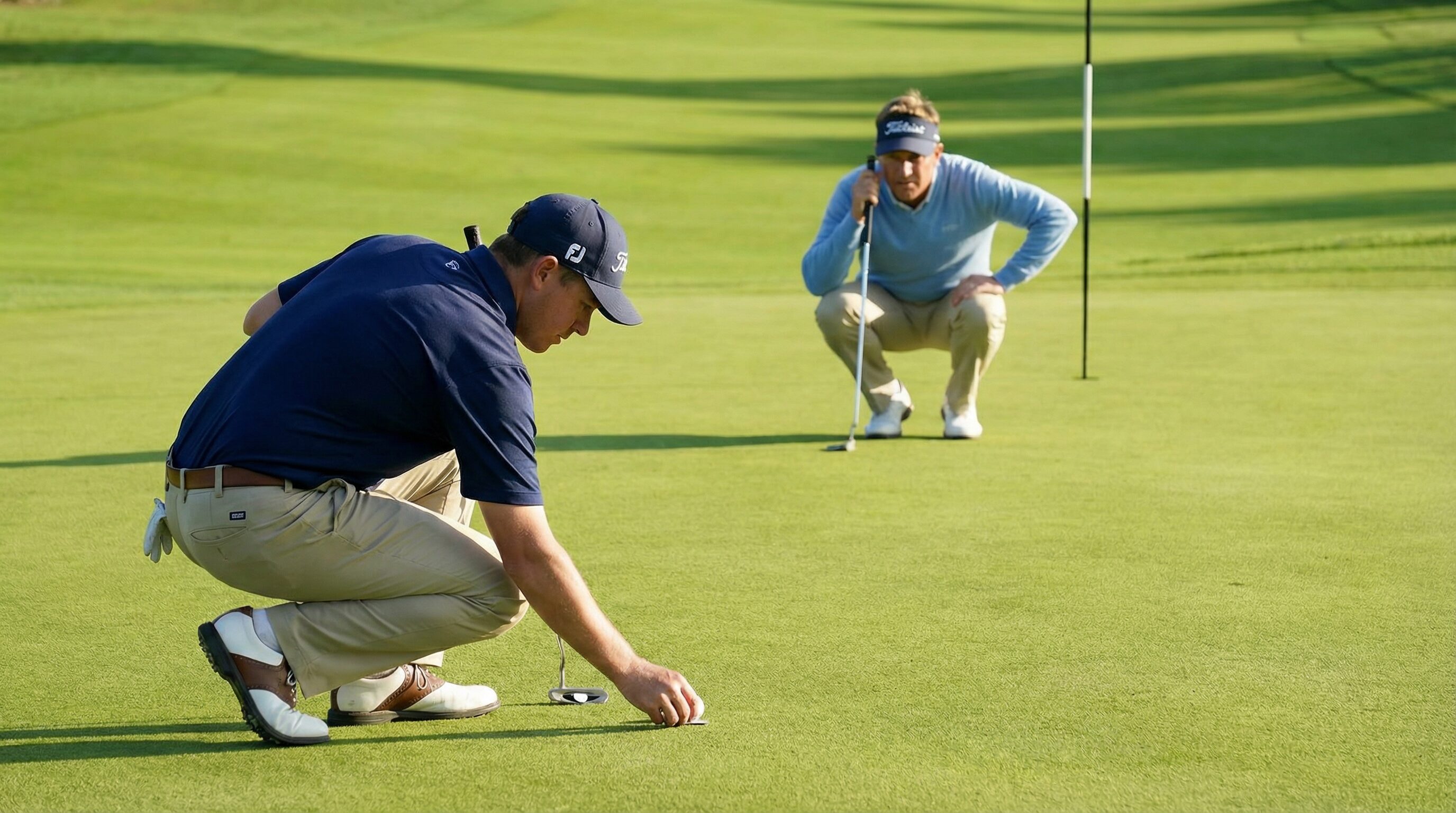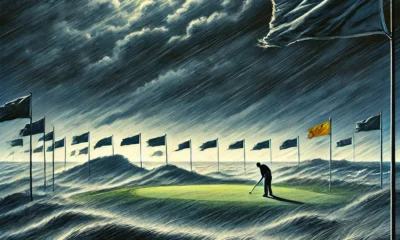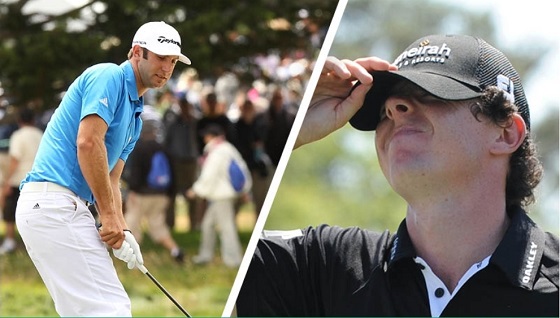Entertainment
[WATCH] Brooks vs. Bryson Best TRASH TALK Moments ?
Blog
The Etiquette Guide Every Golfer Needs (But Nobody Teaches)
Learn golf etiquette in this friendly, non-judgmental guide. From tee box behavior to pace of play, discover the unwritten rules that make golf enjoyable for everyone.

Let me tell you about my first round of golf on a real course. I was nervous, excited, and completely clueless about the unwritten rules of the game. I didn’t know when to walk, when to talk, or where to stand. I felt like everyone was watching me, judging my every move. Looking back, most of that anxiety was in my head, but I wish someone had pulled me aside and explained the basics in a friendly, non-judgmental way. That’s exactly what I’m going to do for you today. Consider this your friendly guide to golf etiquette—the stuff that makes the game more enjoyable for everyone, including you.
Why Golf Etiquette Actually Matters
Golf etiquette isn’t about being stuffy or following arbitrary rules from some country club handbook. It’s about three simple things: keeping the game moving, showing respect for your fellow golfers, and taking care of the course so the next group can enjoy it too. That’s it. When everyone follows these basic principles, golf becomes more fun, less stressful, and way more welcoming for players of all skill levels.
Here’s the truth: nobody expects you to be perfect, especially if you’re new to the game. We’ve all been beginners. We’ve all hit bad shots, lost balls, and felt overwhelmed by the pace of play. What matters is that you’re making an honest effort to be considerate and keep things moving. That’s the spirit of golf etiquette, and it’s something anyone can do regardless of their handicap.

Tee Box Etiquette: Starting Your Round Right
The tee box is where every hole begins, and it sets the tone for the entire experience. The first rule is simple: whoever had the best score on the previous hole gets “honors” and tees off first. On the first tee, you can decide honors by flipping a tee or just agreeing on an order. It’s not a big deal—just pick something and stick with it for the round.
While someone is teeing off, stand quietly to the side or behind them. You don’t need to be silent like you’re in a library, but avoid talking, moving around, or standing directly in their line of sight. It’s just common courtesy. Once they’ve hit their shot, feel free to offer a quick compliment if it was a good one, or a supportive “you’ll get the next one” if it wasn’t. Golf is hard, and a little encouragement goes a long way.
One more thing about the tee box: be ready when it’s your turn. Have your club selected, your ball teed up, and your glove on. You don’t need to rush, but you also don’t want to be fumbling around while everyone waits. Think of it like being ready to order when it’s your turn at a coffee shop—just a little preparation that keeps things flowing smoothly.
Fairway and Green Behavior: Respect and Awareness
Once you’re off the tee, the key to good etiquette is awareness. Pay attention to where other players are and what they’re doing. If someone is hitting a shot, pause and give them space. If you’re looking for a lost ball, don’t spend more than a couple of minutes searching—the rules allow three minutes, but honestly, if you haven’t found it in two, it’s time to drop another ball and keep moving.
When you get to the green, that’s where things can feel a bit more formal, but it doesn’t have to be intimidating. The basic principle is to avoid stepping on someone else’s putting line—the imaginary path between their ball and the hole. Walk around it, not through it. If you’re not sure where their line is, just ask. Nobody will mind.
Mark your ball with a small coin or ball marker when you’re on the green, especially if it’s in someone else’s way. This is just good manners and helps everyone see their lines clearly. And when you’re done with the hole, replace the flagstick carefully and move off the green promptly. The next group is probably waiting, and they’ll appreciate you keeping things moving.

Cart and Course Care: Leave It Better Than You Found It
If you’re using a golf cart, follow the cart path rules posted at the course. Some days it’s “cart path only,” which means you drive on the path and walk to your ball. Other days you might have “90-degree rule,” where you can drive out to your ball but must return to the path at a right angle. These rules exist to protect the course, especially when it’s wet or the turf is stressed.
Course care is one of those things that separates thoughtful golfers from careless ones. Always replace your divots—those chunks of grass you take out when you hit a shot. Most courses provide a sand-and-seed mixture in the carts, or you can replace the actual piece of turf if it came out cleanly. Either way, take five seconds to fix it. The next golfer who lands in that spot will thank you.
On the greens, repair your ball marks. When your ball lands on the green, it often leaves a small indentation. Use a divot repair tool (or a tee in a pinch) to gently lift the turf back to level. This takes about ten seconds and makes a huge difference in the quality of the greens. If you see another ball mark nearby, fix that one too. It’s good karma, and it helps the course stay in great shape.

Pace of Play: The Golden Rule of Golf
Let’s talk about the elephant on the course: pace of play. This is the number one complaint among golfers, and it’s also the most misunderstood aspect of etiquette. Here’s the deal: you don’t need to play fast, but you do need to play efficiently. There’s a difference.
Playing efficiently means being ready when it’s your turn, making decisions quickly, and not wasting time between shots. It means walking with purpose, not dawdling. It means having a plan for your shot before you get to your ball. You can still take your time over the ball and make a good swing—nobody is asking you to rush that part. But everything else should keep moving.
If you’re playing slower than the group behind you and there’s open space in front of you, it’s courteous to let them play through. This isn’t an admission of failure or a sign that you’re a bad golfer. It’s just being considerate. Wave them up, step aside, and let them pass. They’ll appreciate it, and you’ll feel less pressure to hurry. It’s a win-win.
One practical tip: if you’re new to golf or still learning, consider playing from the forward tees. This makes the course shorter and easier, which naturally speeds up play. There’s no shame in this—it’s actually the smart move. You’ll have more fun, hit more greens, and keep pace with the group in front of you.
Bunker Etiquette: Rake Your Mess
When you hit out of a bunker, always rake your footprints and the area where you took your swing. The rake is usually nearby, either in the bunker or just outside it. This takes about fifteen seconds and ensures the next golfer doesn’t have to deal with your mess. Enter the bunker from the low side when possible, take your shot, rake thoroughly, and exit. Simple as that.
Some golfers debate whether the rake should be left in the bunker or outside it. Honestly, it varies by course, and there’s no universal rule. Just put it back where you found it or in a spot that makes sense. The important thing is that you used it.
Sound and Distractions: Keep It Chill
Golf is a game that requires concentration, so be mindful of noise. You don’t need to whisper, but avoid loud conversations, phone calls, or music when others are hitting. If you want to listen to music in your cart, keep it low enough that it doesn’t carry to other groups. And please, put your phone on silent. Nobody wants to hear your ringtone echo across the fairway.
That said, golf is also a social game. Enjoy the company of your playing partners. Share a laugh, tell a story, celebrate good shots. Just be aware of timing. There’s a time for conversation and a time for quiet focus. You’ll figure out the rhythm pretty quickly.

What to Do When You Make a Mistake
Here’s the most important thing I can tell you: everyone makes etiquette mistakes. You’re going to forget to replace a divot, accidentally step on someone’s line, or take too long on a shot. It happens. When it does, just apologize briefly and move on. Nobody is keeping score of your etiquette errors, and most golfers are incredibly forgiving, especially if they see you’re making an effort.
If someone corrects you or offers advice about etiquette, don’t take it personally. They’re trying to help, not criticize. Say “thanks for letting me know” and adjust your behavior. That’s how we all learn. I’ve been playing for years, and I still pick up new etiquette tips from time to time. It’s part of the game.
The Spirit of Golf Etiquette
At its core, golf etiquette is about kindness and consideration. It’s about recognizing that you’re sharing the course with other people who love this game as much as you do. It’s about leaving the course in good shape for the next group. It’s about keeping the game moving so everyone can enjoy their round. And it’s about creating an environment where golfers of all skill levels feel welcome and respected.
You don’t need to memorize a hundred rules or stress about doing everything perfectly. Just focus on being considerate, staying aware of your surroundings, and making an honest effort to follow the basics. That’s ninety percent of golf etiquette right there. The rest you’ll pick up naturally as you play more rounds and observe other golfers.
A Final Word for New Golfers
If you’re new to golf, please don’t let etiquette anxiety keep you off the course. Yes, there are unwritten rules, but they’re not complicated, and they’re not designed to exclude you. They exist to make the game better for everyone. Most golfers are incredibly welcoming and happy to see new people taking up the game. If you’re making an effort to be respectful and keep pace, you’re doing just fine.
Bookmark this guide and review it before your next round. Bring a divot tool and a ball marker. Be ready when it’s your turn. Fix your ball marks. Rake your bunkers. Keep moving. That’s the foundation of good golf etiquette, and it’s something anyone can do.
Golf is a wonderful game with a rich tradition of respect and sportsmanship. By following these simple guidelines, you’re not just being a good playing partner—you’re becoming part of that tradition. And that’s something to be proud of. Now get out there and enjoy your round. We’ll see you on the course.
Blog
A Toast to Tradition: Exploring Food and Drink Customs at Iconic 19th Holes
Learn about the unique customs and drinks for the “19th Hole” from around the world.

The 19th hole, an informal term for the bar or clubhouse where golfers relax and unwind after their round, has evolved into a cultural institution in golfing circles. It’s not just a place to grab a cold drink; it’s a stage for camaraderie, storytelling, and tradition. This article takes you on a journey through the world’s most iconic 19th holes, exploring their unique food and drink traditions that have become as much a part of the game as birdies and bogeys.
The Flavor of Tradition: Signature Dishes and Drinks
Food and drink traditions at the 19th hole vary widely from club to club, reflecting local tastes, cultural influences, and even the unique history and character of the course. Here are some noteworthy examples:
-
-
- The Old Course at St. Andrews, Scotland: At the “Home of Golf,” golfers often enjoy a traditional Scottish meal of haggis, neeps, and tatties, followed by a glass of fine Scotch whiskey.

- Pebble Beach Golf Links, California: The Tap Room at Pebble Beach is famous for its prime rib sandwich and a local craft beer or California wine.

- Augusta National Golf Club, Georgia: The Masters tournament is synonymous with pimento cheese and egg salad sandwiches, typically washed down with a glass of sweet iced tea or the club’s signature azalea cocktail.

- The Old Course at St. Andrews, Scotland: At the “Home of Golf,” golfers often enjoy a traditional Scottish meal of haggis, neeps, and tatties, followed by a glass of fine Scotch whiskey.
-
The Role of the 19th Hole in Golf Culture
The 19th hole isn’t just about food and drink; it’s an integral part of golf culture. It’s a place where:
-
-
- Golfers bond over shared experiences on the course
- Players settle friendly wagers from the day’s round
- Club members engage in social activities and charity events
- Visitors savor the distinctive atmosphere and tradition of the club

-
The Evolution of the 19th Hole
While the 19th hole’s roots are steeped in tradition, it has evolved to meet the changing tastes and expectations of modern golfers:
-
- Many clubs have upgraded their 19th holes from simple bars to full-service restaurants, offering gourmet cuisine and extensive wine lists.
- Health-conscious menus are becoming more prevalent, reflecting a shift towards healthier lifestyles among golfers.
- Craft beer, cocktails, and local wines are gaining popularity, showcasing local flavors and creativity.

From haggis in St. Andrews to pimento cheese in Augusta, the food and drink traditions of the 19th hole are a flavorful part of golf culture. As much as the game itself, these traditions bring golfers together, fostering camaraderie and a shared appreciation for the finer things in life. So, next time you finish your round, take a moment to savor the tradition at the 19th hole. You’ll be partaking in a ritual as old as the game itself.
Feeling inspired to explore these culinary traditions? Book your next golf trip today and experience the unique charm and flavor of the world’s most iconic 19th holes.

Blog
A Field Guide to the 5 Types of Golfers You’ll Meet on a Public Course
Discover the 5 types of golfers you’ll meet on every public course in this humorous field guide. From the Speed Demon to the Social Butterfly, learn to appreciate the diversity of the game.

Golf is a beautiful game, man. It’s you, the course, and the universe all coming together in perfect harmony. Well, that’s the idea anyway. But if you’ve spent any time on a public course, you know that the reality is a bit more… colorful. Every round is like a safari through the wild kingdom of golf, where you’ll encounter a fascinating array of characters, each with their own unique approach to the game. Today, we’re going to explore the five most common species you’ll find on any public course. Consider this your field guide to the golf course ecosystem. No judgment here—just observations from a fellow traveler on this crazy journey we call golf.
The Speed Demon: “Ready Golf” Taken to the Extreme
You know this golfer the moment you see them. They’re practically jogging between shots, their golf cart in a perpetual state of motion, and they’ve already hit their approach shot before you’ve finished marking your ball on the green. The Speed Demon believes that golf should be played at the pace of a track meet, and they have zero patience for anyone who doesn’t share their urgency.
Here’s the thing about the Speed Demon: they’re not necessarily wrong. Slow play is a real problem, and their heart is in the right place. But somewhere along the way, they’ve confused efficiency with chaos. They’re hitting shots while still catching their breath, rarely taking time to read putts properly, and constantly looking over their shoulder to see if anyone is behind them. The irony is that all this rushing usually leads to more mistakes, which means more shots, which means… well, you get the idea.
How to coexist: If you’re paired with a Speed Demon, just let them play through if possible. They’ll be happier, you’ll be happier, and everyone can play at their own pace. If playing through isn’t an option, just do your best to keep up without sacrificing your own game. Remember, golf is supposed to be enjoyable, not a race.
The Analyst: Paralysis by Over-Analysis
On the opposite end of the spectrum, we have the Analyst. This golfer approaches every shot like they’re defending a doctoral thesis. They’ve got a rangefinder, a yardage book, a notebook, and possibly a weather station. They’re checking wind speed, calculating slope, considering barometric pressure, and consulting their swing thoughts checklist before every single shot. A simple eight-foot putt becomes a fifteen-minute expedition into the mysteries of green reading.
The Analyst is usually a genuinely nice person who loves the game deeply. They’ve read every instruction book, watched every YouTube video, and they’re absolutely convinced that the secret to great golf lies in perfect preparation. The problem is that all this analysis leads to paralysis. By the time they’ve finished calculating everything, they’re so wound up that the actual swing becomes an afterthought.
The lesson here: There’s a balance between preparation and overthinking. A little pre-shot routine is great, but at some point, you’ve got to trust your instincts and let it fly. As I like to say, be the ball. Don’t calculate the ball, don’t analyze the ball—just be the ball.
The Optimist: Hope Springs Eternal
The Optimist is perhaps my favorite character on the golf course. This is the golfer who pulls out the driver on every hole, regardless of the situation. Narrow fairway with water on both sides? Driver. Dogleg that requires a layup? Driver. Par three? Well, maybe not, but they’re thinking about it. The Optimist believes that this shot, right now, is going to be the one where everything clicks. Never mind that the last ten drives went sideways—this one is going to split the fairway.
What I love about the Optimist is their unshakeable belief in possibility. They’re not delusional; they’re hopeful. They know they’ve hit great shots before, and they believe they can hit them again. Sure, they might be in the trees more often than the fairway, but they’re having fun, and they never let a bad shot ruin their day. In a game that can be brutally humbling, there’s something admirable about maintaining that kind of positive attitude.
The wisdom: We could all learn something from the Optimist. Golf is hard enough without beating yourself up over every mistake. Embrace the challenge, believe in your ability, and remember that the next shot is always an opportunity for redemption.

The Technician: Equipment Is Everything
The Technician shows up to the course looking like they just walked out of a PGA Tour equipment truck. They’ve got the latest driver, a perfectly fitted set of irons, a putter that costs more than most people’s rent, and a golf bag that could double as a small apartment. They’re constantly tinkering with their setup, adjusting loft settings, changing shafts, and experimenting with different grips. If there’s a new piece of technology on the market, the Technician has already ordered it.
Now, don’t get me wrong—good equipment matters. But the Technician has fallen into the trap of believing that the right gear is the solution to all their problems. They’re convinced that if they can just find the perfect combination of clubs, their game will magically transform. The reality, of course, is that equipment can only do so much. At some point, you’ve got to actually hit the ball.
The reality check: Equipment is important, but it’s not everything. A great golfer can shoot a good score with a mediocre set of clubs, while a mediocre golfer will still struggle with the best equipment money can buy. Focus on fundamentals first, and let the equipment support your game rather than define it.
The Social Butterfly: Golf Is a Party
Finally, we have the Social Butterfly. For this golfer, the actual game of golf is almost secondary to the social experience. They’re here to hang out with friends, tell stories, share a few laughs, and maybe hit a golf ball occasionally. They’ve got snacks, beverages, and a Bluetooth speaker playing classic rock. They’re having the time of their life, and their scorecard is more of a suggestion than an actual record.
The Social Butterfly reminds us of an important truth: golf is supposed to be fun. Yes, it’s a competitive game, and yes, we all want to play well. But at the end of the day, it’s also about spending time outdoors with people you enjoy. The Social Butterfly has figured out how to keep the game in perspective, and there’s something beautiful about that.
The balance: You can be competitive and still have fun. You can care about your score and still enjoy the company of your playing partners. The best rounds are the ones where you play well and have a great time doing it. Don’t take yourself so seriously that you forget to enjoy the journey.

The Truth About Golf Course Characters
Here’s the beautiful thing about all these different types of golfers: they’re all valid. There’s no single “right” way to play golf. Some people love the competition, others love the social aspect, and some just love being outside on a beautiful day. The key is to find your own path and respect that others are on their own journey.
I’ve been all of these golfers at different times in my life. I’ve been the Speed Demon rushing through a round because I had somewhere to be. I’ve been the Analyst overthinking every shot. I’ve been the Optimist pulling driver when I should have hit an iron. And I’ve definitely been the Social Butterfly, more interested in the conversation than the scorecard. The game has room for all of us.
Embrace the Diversity
The next time you’re on the course and you encounter one of these characters, take a moment to appreciate them. They’re part of what makes golf such a rich and interesting game. Sure, the Speed Demon might be a little intense, and the Analyst might slow things down, but they’re all out there trying to figure out this impossible game, just like you.
Golf is a mirror. It reflects who we are, our strengths and weaknesses, our hopes and frustrations. These different types of golfers are really just different aspects of the human experience, all playing out on eighteen holes of grass. And that, my friends, is pretty cool.
So which type of golfer are you? Or maybe you’re a combination of several? Share your thoughts in the comments below, and let’s celebrate the beautiful chaos that is public course golf. After all, it’s just a game, and we’re all just trying to have a good time out there. Be the ball, people. Be the ball.
-

 Product Review6 years ago
Product Review6 years agoThe Perfect Practice Putting Mat Review by Jason Tenzer
-

 Blog5 years ago
Blog5 years agoLoophole Rule Offers PGA Tour Pros a Mulligan
-

 Blog5 years ago
Blog5 years ago2021 Buyer’s Guide: The Top 10 Value Golf Balls For Distance & Feel
-

 Blog5 years ago
Blog5 years agoGolf Marriage Counselor
-

 Product Review6 years ago
Product Review6 years agoTHE ADJUSTABLE IRONS: WALKING STICKS GOLF CLUBS
-

 Blog7 years ago
Blog7 years ago9 Biggest Chokes Of The Past Decade
-

 Blog5 years ago
Blog5 years agoWhat Your Golf Clubs Say About You
-

 Golf News2 months ago
Golf News2 months agoThe latest news in golf
































